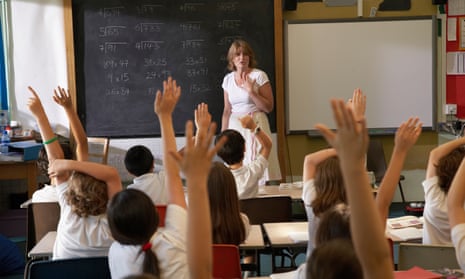Almost all Australian girls aged between 10 and 17 surveyed about gender inequality said they receive unequal treatment to boys, and 91% said it would be easier to get ahead if they were treated like boys.
On Wednesday the child rights agency Plan International Australia released the results from a survey of 1,742 girls in a report called The Dream Gap: Australian girls’ views on inequality.
The survey was conducted by Essential Research and saw 10-17 year olds from across the country asked about their ambitions and views on gender. The girls were asked the same questions, but split into two age groups; 10-14 year-olds and 15-17 year olds, so questions could be asked in age-appropriate ways.
Asked if boys and girls were sometimes treated differently 96% of the 10-14 year old girls and 98% of the 15-17 year-old girls said yes.
Asked if girls were treated as equals at home, 61% of 10-14 year-olds and 36% of 15-17 year-olds said yes. Just 16% of 10-14 year-olds and 7% of 15-17 year olds said girls were treated as equal to men in magazines, while 16% and 6% respectively believed girls were treated equally in sport.
Of girls aged 15-17, 93% said it would be easier to get ahead in life if they were not judged on their appearance. As girls get older, their confidence decreases, the survey found. While 56% of 10 year-old girls viewed themselves as confident at 10, this dropped to just 44% of 17 year-olds. Preliminary data included in the report from a survey to be released next shows just 27% of 18-25 year-old women reported feeling confident.
While sport and media were the places where girls felt most inequality, the report also found 86% of the girls said they were just as good at sport as boys. While 95% of 10 to 14 year-old girls and 96% of 15-17 year-old girls said they were just as good at being leaders as boys, 40% of them believed gender inequality was the biggest barrier to them becoming a leader. And 80% and 90% of the girls respectively said they were as good as boys at science and maths.
“It’s extremely worrying that girls are so rapidly losing their aspirations to leadership, and this correlates with their perceptions of a loss of opportunities for them to lead,” the report found.
Four-fifths of the girls said there was more attention on girls’ looks than boys’. The report calls on the federal government to work with media and the advertising industry to ban sexist advertising and excessive use of Photoshop to prevent girls and boys growing up with unhealthy stereotypes. State and territory governments should remove gendered school uniforms, the report also said, and more should be done to fight the gender pay gap, including conducting pay gap audits.
Lead researcher on the report Dr Rebecca Huntley said the report showed women believed they were capable, but despite this were not being given the opportunities to demonstrate their strengths as they grew up.
“Young Australian women are among the most highly educated in the world and this survey suggests that they believe they can do anything,” Huntley said.
“But they’re able to see genuine barriers to their success that they can’t control, like their gender and the way that they look. A consistent finding from surveys of men’s attitudes to women in the workplace is that men start thinking about these issues when they have daughters. Do we have to wait that long? Why are they not aware before then of what’s happening to their sisters, girlfriends and female friends?”
The deputy CEO Plan International Australia Susanne Legena said Australia needed to follow the lead of the UK, where in July the Advertising Standards Authority toughened rules on ads by banning those that perpetuated sexist stereotypes.
“Parents try to tell their children that they are valued for more than their bodies but then they’re getting these contradictory messages from advertising all of the time,” Legena said.
“Of course you can’t ban everything, but we know sex sells and we keep doing it just because it works rather than challenging it and systemically trying to change the way we depict women and girls.”
She said for societal change to come leaders, including politicians, needed to be “bold and brave”, call out sexism and model equality and respect towards women.
“When you look at Question Time it is the epitome of disrespectful and it favours an aggressive and argumentative type of leadership,” she said. “How do you explain the behaviour of these leaders to children? Women politicians are making great gains and standing up for the need to respect women but that has to permeate everything we do and we need men to call out people behaving badly.”
Between 25% and 34% of girls consider themselves to be shy and 25 to 33% consider themselves quiet, while only 1 to 3% of girls considered these to be
valuable qualities in a leader. Kindness and friendliness were values considered by girls surveyed to be both a quality of leaders and a quality girls themselves possess.
But this was not translating into women with a diversity of traits being given opportunities to lead, Legena said. She said it was time to reconsider which qualities should be considered as strengths.
“Change has been glacial,” she said. “Gender inequality its causing us harm and pain, and you wonder what could be achieved if society was willing to unleash the talent and potential of half of the population. I don’t know why we are being so circumspect and slow in giving people equality and human rights in Australia.”
